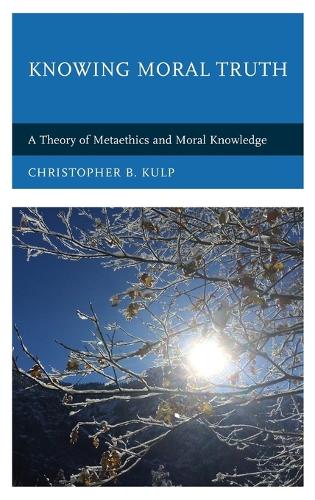
Knowing Moral Truth: A Theory of Metaethics and Moral Knowledge
(Hardback)
Available Formats
Publishing Details
Knowing Moral Truth: A Theory of Metaethics and Moral Knowledge
By (Author) Christopher B. Kulp
Bloomsbury Publishing PLC
Lexington Books
9th May 2017
United States
Classifications
Professional and Scholarly
Non Fiction
Philosophy: epistemology and theory of knowledge
170.42
Physical Properties
Hardback
186
Width 158mm, Height 239mm, Spine 18mm
417g
Description
This is a book on metaethics and moral epistemology. It asks two fundamental questions: (i) Is there any such thing as (non-relative) moral truth; and (ii) If there is such truth, how do we come into epistemic contact with it Roughly the first half of the book is aimed at answering the first question. Its animating idea is that we should take our ordinary, tutored moral judgments seriouslyjudgments typified by our conviction that it is clearly true that some acts, policies, social norms et al. are morally right or wrong, permissible or impermissible, praiseworthy or condemnable, etc., no matter when, where, or by whom they are performed. In order to provide a firm conceptual basis for such judgments, the book develops a theory of moral truth, based on a theory of moral facts. The account of moral truth and moral facts is further grounded on a theory of moral properties. In short, the book develops a theory of moral realism, roughly, the view that there are indeed non-relative, first-order moral truths. The second half of the book is aimed at answering the second question above. Building squarely on the metaethical theories developed earlier, the book argues for a non-empiricist theory of justified moral belief and knowledge. Pivotal to this project is a careful analysis of various forms of moral skepticism, by which I mean any conception of morality substantially at odds with the general contours of our ordinary moral thinking. All such skepticisms are rejected, and in their place a broadly intuitionist, epistemically fallibilist theory of moral knowledge is advanced. The conclusion reached is that we have very strong reason to believe that our ordinary moral thinking, although certainly liable to error, is fundamentally sound. Moral knowledge is ubiquitous.
Reviews
Knowing Moral Truth is a metaethics work well worth reading. Kulp's writing is clear and exhibits greater style than most philosophy writing. With his paradigmatic approach, aside from working out the details of his theory, he takes on various moral skeptics. Throughout the book he makes critical points of historical philosophical positions he regards as errant, although the contemporary metaethics enthusiast might say he makes these points too often. The major question to be asked of Christopher Kulp's book is, does his approach advance moral realism Although some intuitionists will insist that the proper methodology is to work from the abstract and universal toward the particularity of moral situations, there is nothing mistaken in having another starting point that is based in the particular that works toward the abstract and universal. Thus Knowing Moral Truth is an advance, especially in ethics methodology. * Review of Metaphysics *
Author Bio
Christopher B. Kulp is associate professor of philosophy at Santa Clara University.
